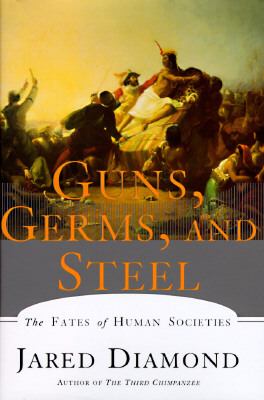
by Jared Diamond
Library Journal
: Most of this work deals with non-Europeans, but Diamond's thesis sheds light on why Western civilization became hegemonic: "History followed different courses for different peoples because of differences among peoples' environments, not because of biological differences among peoples themselves." Those who domesticated plants and animals early got a head start on developing writing, government, technology, weapons of war, and immunity to deadly germs. (LJ 2/15/97) Copyright 1999 Cahners Business Information, Inc. Distributed by Syndetic Solutions Inc. Terms
Publishers Weekly
: In a boldly ambitious analysis of history's broad patterns, evolutionary biologist Diamond (The Third Chimpanzee) identifies food production as a key to the glaring inequalities of wealth and power in the modern world. Dense, agriculture-based populations, unlike relatively egalitarian hunter-gatherers, bred chiefs, kings and bureaucratic "kleptocracies" that transferred wealth from commoners to upper classes. Such bureaucracies, Diamond maintains, were essential to organizing wars of conquest; moreover, farming societies were able to support full-time craft specialists who developed technical innovations and steel weapons. As a result, European conquerors and their colonizing descendants, bringing guns, cavalry and infectious diseases, overwhelmed the native peoples of North and South America, Africa and Australia. Using molecular biological studies, Diamond, a professor at UCLA Medical School, illuminates why Eurasian germs spreading animal-derived diseases proved so devastating to indigenous societies on other continents. Refuting racist explanations for presumed differences in intelligence or technological capability and eschewing a Eurocentric worldview, he argues persuasively that accidental differences in geography and environment, combined with centuries of conquest, genocide and epidemics, shaped the disparate populations of today's world. His masterful synthesis is a refreshingly unconventional history informed by anthropology, behavioral ecology, linguistics, epidemiology, archeology and technological development. Photos not seen by PW. BOMC, History Book Club, QPB and Newbridge Book Clubs selections. Copyright 1997 Cahners Business Information, Inc. Distributed by Syndetic Solutions Inc. Terms
|